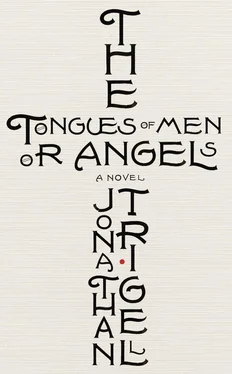‘ Paul . I am called Paul now. I am not the man I once was.’
‘No.’ John-Mark looks at him through slits that accentuate the darkness of his eyes. ‘No, you are not.’

John-Mark leaves them that night. He returns to the port to find a ship to take him home to Judaea. Paul shrugs when Barnabas tells him.

The three-become-two continue passing from town to town, speaking in the synagogues, trying to sway these diaspora Jews to The Way. And many do come across — persuaded by Paul’s unfakeable passion — and are baptized in the rinsing waters of city rivers. Most are not convinced, but anyway enjoy the speeches and the debates that follow them, because it is enlivening to listen to diverse voices and original subjects in these Sabbath sessions, and there is no harm in hearing the views of Judaism’s newest sect.
But others take against Paul’s words, more vehemently than John-Mark did. Others eject Paul from their houses of teaching and make threatenings that chase him and Barnabas from their neighbourhoods. These others are fearful, maybe, that the precarious position of out numbered Jews in Empire cities risks unbalance in talk of messiahs. Or perhaps Paul’s words begin to sound less like a fresh sect of Judaism and more like the first bursting fungus of something otherwise and strange.

At the city of Lystra, Paul feels ready to perform another miracle. Upon a lame man, whose eyes gloss with belief as Paul speaks. Who clutches a crutch of carob wood, shaft almost as thick as the thighs of his brittle cripple’s legs. And he walks some steps, when Paul bids him to, more than he has walked in years. Hands floating before him, as though grasping for support that isn’t there, unsteady but advancing nonetheless, like a dark-alley drunk. And he swears, to those who gather round to lift him up again, that within days he will be strolling the town as blithely as any of them.

But those who have taken against Paul begin to cluster. Malevolent scarecrow men afraid of change and enfranchised speech. They follow him and counter him. They attack his words. They shout, ‘Blasphemy!’ And when still he will not cease, they take up rocks.
The weight that crushed Stephen can crush again. Not that these are the same stones: every land has stones of its own. Those of Judaea are lime and pale, while these are grey and dappled; but they would serve just as well, to silence a voice.
Caught unexpectedly and alone, Paul is pelted and bloodied, left for dead. They do not drop the final boulder on his skull. Who knows if this is mercy or thought unnecessary? He did not move or scream for minutes while the stones still came. Consciousness left him with the first blow to the crown, which opened a seam to spread his blood upon the ground. Head wounds bleed heavily. It must be hard for those unaccustomed to murder to be sure when it is accomplished. The attackers flee, leaving Paul dripping blood into the soil, like the flayed god Attis of a Tarsus childhood. That dying and resurrected saviour, hanged from a tree. For without the shedding of blood there is no forgiveness, as Hebrews says.
Thoughts reel and tumble on the frontier of concussion and oblivion. Paul, who is Saul, sees Stephen and Jesus and himself in a jumble of faces, all of them red-wet and resurrected, circling like spokes, joined at a hub of blood. And Jesus, who looks like Stephen — goat beard split, hair clotted with black — is in Saul, and God is in them all. And Saul is in his body and out of it. But the body is just a tent, a temporary shelter, or else how can he see it there, broken on the ground, and yet be alive and elsewhere and here and looking at it? And Saul’s blood is smeared on the stones and leaching into the soil. And Jesus is in Saul, who isn’t Saul but Paul. And a man who is them or isn’t, but is in Christ, is taken up to the third Heaven. Whether this is in the body or out of the body he doesn’t know — God knows. But he is taken up to Paradise and hears inexpressible things, things that no one is permitted to tell. The revelation of mysteries hidden for long ages now revealed and made known. Those who knew the Christ in the flesh know Him no longer. But Paul is in Christ and Christ is in him. Whether in the body or apart from the body he doesn’t know, but God knows. And Stephen says, ‘God forgive you,’ with his broken teeth and his mouth bubbling blood. And the consumption of blood is prohibited, but a chalice of wine could serve as surrogate; could just as effectively bless with immortality. And Paul will have his atonement; Paul will have his blood.
Nine Hours before the Crucifixion
He breaks his nightly fast — at an ungodsly time, when by rights he should still be peacefully dreaming about chewing the nipples of some full-breasted boat-fresh slave — with a cutlet of pork, faintly gilled like the underside of a mushroom, served red-rare, still swampy in its own grume. There is pleasure to be taken in such small things. Don’t eat blood. Don’t eat pig. Don’t do any fucking thing on the Sabbath. These tiresome, touchy Judaeans. After all the expenditure, planning and petitioning for a chance to govern, of all the lands in the Empire, to end up with this one.
Pontius had only just arrived — four years back, this was — when he almost had his first full-blown riot. Over nothing. Nothing that would cause a problem anywhere else in the known bloody world anyway. You can’t put up statues in Jerusalem . He knew that, was advised of that — multiple times — before he left Rome. Not even in your own bloody apartments can you put a statue, never mind in the Temple, where there bloody well ought to be one of the emperor or Jupiter or some decent Roman god. But, no, the Israelites won’t even have a statue of their own bloody ‘Lord of Hosts’. But Pontius was grudgingly fine with it; it’s ridiculous pandering, of course, but if that’s how it’s always been done, then so be it.
The centurion, Gaius, enters.
‘The high priest is here with the prisoner, Prefect.’
‘Well, what are you waiting for? Bring them up.’
‘Prefect.’ The centurion looks uncomfortable.
‘What is it?’
‘The high priest won’t come up, Prefect.’
‘No, no. Why by the arse-of-Medusa would he enter such an unclean habitation as this?’ Pontius gestures about the mar-less palace, marble as white as Alpine snow, shining ivory that might have come from Hannibal’s elephants. ‘These people, Gaius, these fucking people.’
Pontius rises and spreads his arms so that a slave can place a thick wool cloak across his shoulders and fasten it by the two rings attached to the front of his breastplate; it hangs through them in twin puffs of scarlet cloth.
‘I have to keep the place statue-less, for their sensibilities — not so much as one image of Venus the Modest, half hiding her little titties — and they won’t come inside anyway. So tell me why I bother.’ The instruction is left to drift, not aimed particularly either at Gaius, or the slave, or any of the other attendants.
And, of course, Pontius knows full well why he bothers: so he doesn’t have another incident like there was when he arrived. Not that he even put up a statue back then. It was just some standards of the legions, placed around palace walls, that was all. But, of course, some of the standards have an image of the emperor’s head on them and the emperor is a god. And that was sufficient to have volley after volley of priests and merchants and Pharisees and Sadducees and Herodians all pleading and imploring for the standards to be taken down. Pontius should have been congratulated for uniting factions ordinarily in discord. But when he declined all of their entreaties as insulting to the emperor, he had found his palace surrounded. Not by warriors, but by people protesting. For five bloody days, great crowds gathered round, bringing commerce to a standstill and creating a hubbub and a spectacle that could not be allowed to go on indefinitely.
Читать дальше













